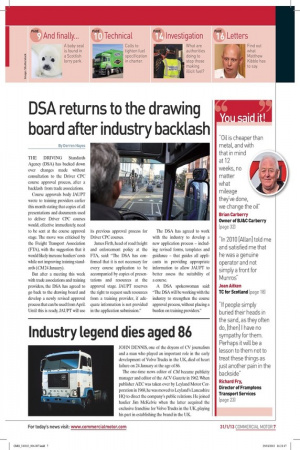DSA returns to the drawing board after industry backlash
Page 5

If you've noticed an error in this article please click here to report it so we can fix it.
By Derren Hayes THE DRIVING Standards Agency (DSA) has backed down over changes made without consultation to the Driver CPC course approval process, after a backlash from trade associations.
Course approvals body JAUPT wrote to training providers earlier this month stating that copies of all presentations and documents used to deliver Driver CPC courses would, effective immediately, need to be sent at the course approval stage. The move was criticised by the Freight Transport Association (FTA), with the suggestion that it would likely increase hauliers' costs while not improving training standards (CM24 January).
But after a meeting this week with trade associations and training providers, the DSA has agreed to go back to the drawing board and develop a newly revised approval process that can be used from April. Until this is ready, JAUPT will use its previous approval process for Driver CPC courses.
James Firth, head of road freight and enforcement policy at the FTA, said: "The DSA has confirmed that it is not necessary for every course application to be accompanied by copies of presentations and resources at the approval stage. JAUPT reserves the right to request such resources from a training provider, if adequate information is not provided in the application submission."
The DSA has agreed to work with the industry to develop a new application process — including revised forms, templates and guidance — that guides all applicants in providing appropriate information to allow JAUPT to better assess the suitability of a course.
A DSA spokeswoman said: "The DSA will be working with the industry to strengthen the course approval process, without placing a burden on training providers."







































